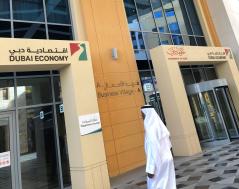DED Sees 4.6% Increase In New Licences In 2018 As Dubai Reinforces Investor Confidence

The Department of Economic Development (DED) in Dubai issued 20,467 new licences during the year 2018 as the emirate continued to enhance its appeal as a destination for sustainable business growth. Overall, 248,769 business registration and licensing transactions were recorded in the ‘Business Map’ digital platform of DED in 2018 – an increase of 4.6% over 2017 – as more and more businesses and investors took advantage of the emirate’s competitiveness and increasing opportunities across diverse economic sectors.
Licence Renewals accounted for 128,965 transactions at the Business Registration & Licensing (BRL) sector in DED in 2018 while 24,859 were related to Initial Approvals. There were also 35,563 transactions related to Trade Name Reservation, 50,148 Auto Renewal transactions, 1,202 Instant Licence procedures, and 1,075 DED Trader transactions.
As economic diversification continued to gather pace in 2018, all major economic sectors saw demand for varied BRL services. Among the new licenses 63.2% were Commercial, 34.5% Professional, and 1.1% were related to Tourism.
The share of Industrial licences moved from 1.1% to 1.2% between 2017 and 2018, and the increase of over nine per cent assumes significance in the backdrop of the Dubai Industrial Strategy 2030, which aims to develop Dubai into an industrial and innovation hub.
The outsourced centres, which are the foremost service outlets of DED and key players in enhancing ease of doing business across Dubai, handled 75% (214,337) of the total BRL transactions in 2018.
Among the main regions, Bur Dubai had the highest share of new licences (11,435), Deira had 8,985 and Hatta, 47. The top sub-regions that accounted for 48.3% of all the transactions in 2018 were: Burj Khalifa (11.8%), Port Saeed (6%), Al Marrar (5.6%), Al Fahidi (4.3%), Naif (4.0%), Dubai World Trade Centre 1 (3.7%), Al Garhoud (3.6%), Hor Al Anz East (2.6%), Al Karama (2.4%), Al Barsha (2.3%) and Al Khubaisi (2.0%).
Trade & repair services accounted for 31.6% of the economic activities licensed in 2018, followed by: Real estate, leasing & business services (22.7%), Building & construction (14.5%), Community & personal services (9.7%), Hospitality & hotels (7.2%), Transport & storage (5%), Manufacturing (2.9%(, Financial brokerage (2.6%), health & labour (1.4%), Education (1.4%), Agriculture (0.5%), Mining & natural resources (0.2%).
The Business Map also showed that new business owners accounted for 77.8% (19,481) of the licenses issued in 2018. Women increased their share among the new business owners to 22.2% (5,543) from 12% in 2017, underlining Dubai’s importance as an ideal launchpad for all categories of entrepreneurs and investors. The top 10 nationalities of new licencees in 2018 were Indians, Pakistanis, Egyptians, Chinese, British, Saudis, Bangladeshis, Jordanians, Canadians and Filipinos in that order.
The Business Map seeks to reflect the economic realities in Dubai by providing vital data on each license category including their numbers and distribution as well as investor trends on a monthly basis.


